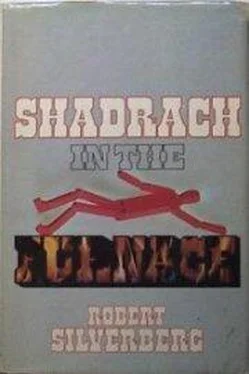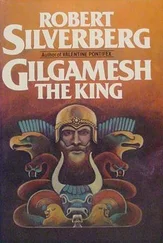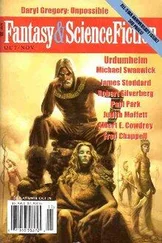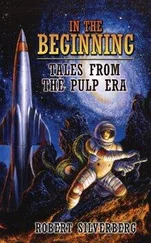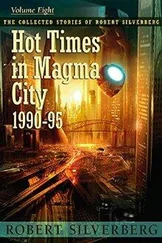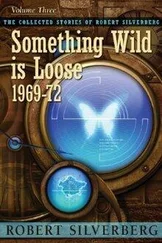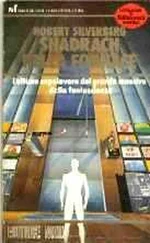“Dead,” the old man says finally, in English, delivering the word like a monstrous weight that he drops ai Shadrach’s feet.
“Dead?”
“Dead. You — make — me — dead—”
The words fall one after another from the ravaged throat without expression, without inflection, without emphasis. You. Make. Me. Dead. Is he accusing me of having given him the disease, Shadrach wonders, or is he asking for euthanasia?
“Dead! You! Make! Me! Dead!” Then more Swahili. Then some strained rheumy coughs. Then tears, amazingly copious, flooding in deep channels down the dusty cheeks. The hand that grips Shadrach’s forearm tightens with sudden incredible strength, crushing bone against bone and wringing a sharp yelp of pain from him. Then the unexpected pressure is withdrawn; the old man stands free for a moment, tottering; from him comes a hoarse clucking noise, an unmistakable death rattle, and life leaves him so instantly and completely that Shadrach has a quasi-hallucinatory vision of a skull and bones within the old man’s tattered clothes. As the body falls Shadrach catches it and eases it to the pavement. It weighs no more than forty kilos, he guesses.
What now? Notify the authorities? Which authorities? Shadrach looks about for a Citpol, but the street, busy a few minutes ago, is mysteriously empty. He feels responsible for the body.
He can’t simply abandon it where it dropped. He enters the curio shop to find a telephone.
The proprietor is a sleek, plump Indian, sixty years old or so, with large liquid eyes and thick dark silver-flecked hair. He wears an old-fashioned business suit and looks dapper and prosperous. Evidently he has witnessed the little curbside drama, for he bustles forward now, palms pressed together, lips clamped in a fussy oh-dear expression.
“How regrettable!” he declares. “That you should be troubled in this way! They have no decency, they have no sense of—”
“It was no trouble,” Shadrach says quietly. “The man was dying. He didn’t have time to think about decency.”
“Even so. To importune a stranger, a visitor to our—”
Shadrach shakes his head. “It’s all right. Whatever he wanted from me, I couldn’t provide it, and now he’s dead. I wish I could have helped. I’m a doctor,” he confides, hoping the disclosure will have the right effect.
It does. “Ah!” the shopkeeper cries. “Then you understand these things.” The sensibilities of doctors are not like those of ordinary beings. It no longer embarrasses the proprietor that one of his shabby countrymen has had the poor taste to inflict his death on a tourist.
“What shall we do about the body?” Shadrach asks.
“The Citpols will come. Word gets around.”
“I thought we might telephone someone—”
A shrug. “The Citpols will come. There is no importance. The disease is not contagious, I understand. That is, we are all infected from the days of the War, but we have nothing to fear from those who display actual symptoms. Or from their bodies. Is this not true?”
“It’s true, yes,” Shadrach says. He glances uncomfortably at the small sprawled corpse, lying like a discarded blanket on the sidewalk outside the store. “Perhaps we ought to phone anyway, though.”
“The Citpols will come shortly,” the shopkeeper says again, as if dismissing the subject. “Will you have tea with me? I rarely have the opportunity to entertain a visitor. I am Bhishma Das. You are American?”
“I was born there, yes. I live abroad now.”
“Ah.”
Das busies himself behind the counter, where he has a hotplate and some packets of tea. His indifference to the body on the street continues to distress Shadrach; but Das does not seem to be an unintelligent or insensitive man. Perhaps it is the custom, out here in the Trauma Ward, to pay as little attention as possible to these reminders of the universal mortality.
In any event Das is right: the Citpols do indeed arrive swiftly, three black-skinned men in the standard uniforms, riding in a long somber hearselike vehicle. Two of them load the body into the car; the third peers through the shop window, staring long and intently at Shadraeh and nodding to himself in an unfathomable, oddly disturbing way. The Citpols finally drive away.
Das says, “We will all die of the organ-rot sooner or later, is this not true? We and our children as well? We are all infected, they say. Is this not true?”
“True, yes,” Shadrach replies. Even he carries the killer DNA enmeshed in his genes. Even Genghis Mao. “Of course, there’s the Antidote—”
“The antidote. Ah. Do you believe there is indeed an antidote?”
Shadrach blinks. “You doubt it?”
“I have no certain knowledge of these things. The Chairman says there is an antidote, and that it will soon be given to the people. But the people continue to die. Ah, the tea is ready! Is there, then, an antidote? I have no idea. I am not sure what to believe.”
“There is an antidote,” says Shadrach, accepting a delicate porcelain cup from the merchant. “Yes, truly there is. And one day it will be given to all the people.”
“You know this to be fact?”
“I know it, yes.”
“You are a doctor. You would know.”
“Yes.”
“Ah,” Bhishma Das says, and sips his tea. After a long pause he says, “Of course, many of us will die of the rot before the antidote is given. Not only those who lived in the days of the War, but even our children. How can this be? I have never understood this. My health is excellent, my sons are strong — and yet we carry the plague within us too? It sleeps within us, waiting its moment? It sleeps within everyone?”
“Everyone,” Shadrach says. How can he explain? If he talks of the structural similarities between the organ-rot virus and the normal human genetic material, if he describes how the virus liberated during the long-ago war was capable of integrating itself into the nucleic acid, into the germ plasm itself, becoming so intimately entwined with the human genetic machinery that it is passed from generation to generation with normal cellular genes, a deadly packet of DNA that can turn lethal at any time, how much of this will Bhishma Das comprehend? Can Shadrach speak of the inextricability of the lethal genetic material, the inexorable way in which it must be incorporated into the genetic endowment of any child conceived since the Virus War, and get the meaning across? The intrusive organ-rot gene has become as intimate a part of the human heritage as the gene that puts hair on the scalp or the one that puts calcium in the bones: our tissues now are automatically programmed at birth to deteriorate and slough off when some unknown inner signal is given. But to Bhishma Das this may be as baffling as the dreams of Brahma. Shadrach says at last, after a moment’s pause, “Everyone who was alive when they turned the virus loose absorbed it into his body, into the part of his body that determines what he transmits to his children. It can’t be eradicated once it enters that part. And so we pass the virus along to our sons and daughters the way we do the color of our skins, the color of our eyes, the texture of our hair—”
“A dreadful legacy. How sad. And the antidote, Doctor? Would the antidote free us from this legacy?”
“The antidote they have now,” Shadrach says, “keeps the virus from having a harmful effect on the body. It neutralizes it, stabilizes it, holds it in a state of latency. You follow me?”
“Yes, yes, I understand. In the deep freeze!”
“So to speak. Those who receive the antidote have to take a new dose every six months, at present. To hold the virus in check, to keep the organ-rot from breaking out in them.”
“More tea, Doctor?”
Читать дальше
